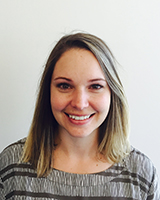Sarah Woolsey, PhD

Research Scientist
ADME/DMPK
Charles River Laboratories
e. sarah.j.woolsey@gmail.com
www.linkedin.com/in/sarahjoywoolsey
Interview:
Q: Tell us a bit about your graduate research. What were your most exciting findings?
My PhD research focused on non-alcoholic fatty liver disease (NAFLD), which is a form of liver disease defined by lipid accumulation within hepatocytes. It is highly associated with obesity, diabetes, dyslipidemia and hypertension and is commonly described as a hepatic manifestation of the metabolic syndrome. The liver is the principal site of drug metabolism, which suggests that NAFLD patients may have altered drug metabolism. Therefore, my overall research goal was to investigate the effect of NAFLD on one of the most important drug metabolizing enzymes, cytochrome P450 3A4 (CYP3A4).
One of the most exciting findings was determining that CYP3A4 activity and expression are reduced in NAFLD patients. We were the first group to phenotype CYP3A4 activity in vivo in biopsy proven NAFLD patients and compare those results to healthy volunteers.
Q: Did you know when you entered graduate school that you would most likely pursue a career outside academia?
Honestly, yes! During undergrad I thought that I would initially pursue a graduate degree in organic or analytical chemistry; however, after taking an introductory pharmacology course I realized that pharmacology combined my two major interests, chemistry and physiology. Due to these interests, I wanted to pursue a career in drug development with a focus on pre-clinical investigation and pharmacokinetic modeling. This passion was solidified after being given the opportunity to work as a summer intern in the small molecule ADME/DMPK department at Genentech in San Francisco. All of this would not have been possible without my PhD supervisor, Dr. Rommel Tirona.
Q: What skills did you acquire in graduate school that help you in your current position? How did your degree give you an advantage in attaining your position?
While I have only been in my position at Charles River Laboratories for about two months, the major skills that stand out are the ability to absorb knowledge quickly and independently. During the first week of work it was evident that the ADME/DMPK department was spread very thin and there was difficulty keeping up with everyday tasks. Therefore, I have been required to learn skills quickly and independently (when possible), to immediately help with the workload.
I think my degree gave me an incredible advantage in attaining my position because I was lucky enough to have course based and hands-on pharmacokinetic training. I am routinely analyzing data from in-life pharmacokinetic and toxicokinetic studies, therefore having this previous training was very beneficial. Furthermore, I was exposed to organizing and performing a human clinical trial as well as in vivo/in vitro studies. This has allowed for a more comprehensive understanding of studies when reading protocols, organizing statistical analysis plans, and deciding how to successfully and efficiently analyze study data.
Q: How did you learn about the posting for your current job?
I was lucky enough to have someone recommend me for the job. I had previously worked with this individual during my summer internship at Genentech.
Q: What is one piece of advice you can offer to current graduate students? To current post-doctoral fellows?
Make short-term/achievable goals and persevere! As everyone in research knows, research can be mentally, physically, and emotionally draining. It is not a career that has consistent rewards or consistent positive reinforcement. However, with that said, it has made me a better, stronger, and more confident scientist. Without those times of complete frustration, I would never have appreciated the times of success and elation that is accompanied with research. Furthermore, I would never have learned how to overcome those hardships and obstacles. By making short-term/realistic goals that I was able to accomplish by the end of the day, or week, I discovered that I felt more motivated and successful afterwards. It kept me on track in terms of study/experiment goals and it was my own method of positive reinforcement. I currently have a notebook at work with my weekly “To-do” lists. It has already helped me succeed and quickly move forward in my new position.
Q: What is your favorite part of your job?
My favorite part of my job is analyzing data sets from actual in vivo pharmacokinetic/toxicokinetic (PK/TK) studies that investigate potential drug entities. Being a part of the drug development process and having exposure to a significant amount of PK/TK data is invaluable to me and personally rewarding. I am also looking forward to becoming a study director. As a study director I will be able to oversee a study in its entirety, from the formulation of the test article to observing the in-life procedures, bioanalytical analyses, ADME analysis including autoradiography, and more!
Q: What does your perfect Sunday look like?
I have been taking up some new hobbies since starting my new job, so a perfect Sunday would be a round of golf and then relaxing with some video games!








